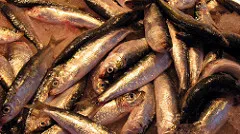Various health agencies recommend dietary intake of the two fatty acids omega-3 Eicosapentaenoic Acid (EPA) and Docosahexaenoic Acid (DHA) at a level between 250 and 500 mg/day.

Yet, as their main source is fish and 80% of fish stocks are estimated to be fully exploited, overexploited or depleted, there is a conflict between health recommendations and the sustainability of fisheries. This French study estimates the environmental impacts of eight different diets corresponding to four food consumption patterns and two levels of omega-3. It uses a straightforward life cycle analysis approach to do so. It addresses three main questions:
- What are the environmental impacts of the current French diet and omnivorous and vegetarian diets compliant with French nutritional guidelines at the macronutrient level?
- Does improving the omega-3 profile of diets affect their environmental impacts?
- Which improvement options can reduce environmental impacts of diets?
Specifically, they looked at potential changes in omega-3 content achieved by farm gate level measures rather than dietary changes (e.g. changing to dairy with higher omega-3 but not increased fish consumption). This included modifying animal feed rations to increase EPA and DHA content in the resulting animal products.
The findings of the study show that the diets with increased omega-3 content had slightly lower or similar impact to those of standard versions of the diets. The differences were small, no larger than 1.5 percentage points. The study indicates that providing healthier diets without increasing environmental impacts or pressure on fish stocks may be a possibility.
However, the diets which did not contain fish, even after improved omega-3 content, were estimated to fall far short of dietary recommendations, despite the inclusion of animal products enriched in EPA and DHA.
Abstract
A high incidence of cardiovascular disease is observed worldwide, and dietary habits are one of the risk factors for these diseases. Omega-3 polyunsaturated fatty acids in the diet help to prevent cardiovascular disease. We used life cycle assessment to analyse the potential of two strategies to improve the nutritional and environmental characteristics of French diets: 1) modifying diets by changing the quantities and proportions of foods and 2) increasing the omega-3 contents in diets by replacing mainly animal foods with equivalent animal foods having higher omega-3 contents. We also investigated other possibilities for reducing environmental impacts. Our results showed that a diet compliant with nutritional recommendations for macronutrients had fewer environmental impacts than the current average French diet. Moving from an omnivorous to a vegetarian diet further reduced environmental impacts. Increasing the omega-3 contents in animal rations increased Eicosapentaenoic Acid (EPA) and Docosahexaenoic Acid (DHA) in animal food products.
Providing these enriched animal foods in human diets increased their EPA and DHA contents without affecting their environmental impacts. However, in diets that did not contain fish, EPA and DHA contents were well below the levels recommended by health authorities, despite the inclusion of animal products enriched in EPA and DHA. Reducing meat consumption and avoidable waste at home are two main avenues for reducing environmental impacts of diets.
Citation
Coelho CRV, Pernollet F, van der Werf HMG (2016) Environmental Life Cycle Assessment of Diets with Improved Omega-3 Fatty Acid Profiles. PLoS ONE 11(8): e0160397. doi:10.1371/journal.pone.0160397
Read the full article here (open access)
You can read related research by browsing the following categories of our research library:
Primary production: aquaculture and fisheries; Fish and aquaculture; Life Cycle Analysis




Comments (0)